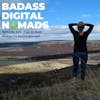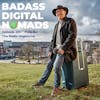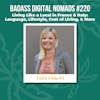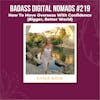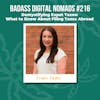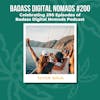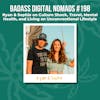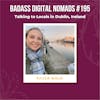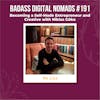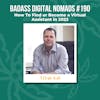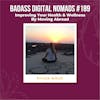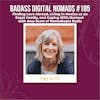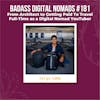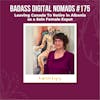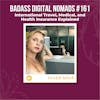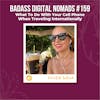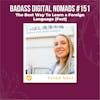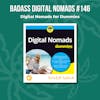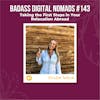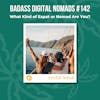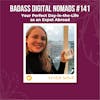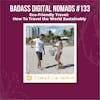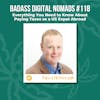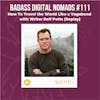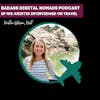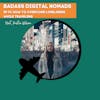Medical Tourism and the Cost of Healthcare Abroad
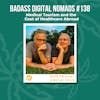
Learn the prices medical tourism, dental care abroad, travel insurance, and overseas healthcare for expats and digital nomads from Kristin and her guests, Brent Hartinger and Michael Jensen. This is Part 2 of a conversation with Brent and Michael Are Going Places.
Learn the prices medical tourism, dental care abroad, travel insurance, and overseas healthcare for expats and digital nomads from Kristin and her guests, Brent Hartinger and Michael Jensen.
This is Part 2 of a conversation with Brent and Michael Are Going Places. ➡️ Listen to Part 1 here on Living Like a Local Anywhere in the World.
QUESTIONS ANSWERED:
I. HEALTHCARE ABROAD:
- Which countries have the best medical care?
- How is the quality, cleanliness, and prices of medical care abroad?
- Are there English-speaking doctors abroad?
- How is the healthcare in Mexico?
- How much does a dental cleaning cost in different countries?
- How much does an ambulance cost abroad?
- How do you find recommendations for doctors abroad?
- What travel insurance should you use?
- When should you buy travel insurance?
- Is it better to use public or private hospitals in other countries?
II. SLOW TRAVEL:
- What is Geo-Arbitrage?
- Living on $100k per year in Seattle versus $50k while traveling full-time
- How to choose your next destination as a digital nomad?
- How do you know when it’s good to move onto a different country?
- Is one month in each destination long enough to get to know a place?
- What is your Digital Nomad Exit Strategy? Will you be nomads forever?
- Have you been to any “dangerous” countries?
- How do you finance your travels?
III. SAFETY FOR GAY AND MINORITY TRAVELERS:
- Is it safe to travel everywhere?
- Doing your due diligence on destinations
- Female and solo travelers
- Fear of solo travel
- Are certain countries “dangerous” or homophobic?
- Human rights and white privilege
- Religious beliefs in foreign countries
- Being held to a different standard as Americans
- Should you tell people if you’re gay or hide it?
- Following your gut instinct
EPISODE 138 TOPICS DISCUSSED:
I. HEALTHCARE ABROAD:
- Cost and quality of medical care abroad compared to the USA
- Health insurance for travelers and digital nomads
- When to buy travel insurance
- Kristin’s and Co’s best and worst dental cleanings abroad
- What to do in case of emergency
- Fears of getting bankrupt because of medical emergencies
- How to calculate your cost-of-living abroad
II. SLOW TRAVEL:
- Making friends in different countries
- Freedom and flexibility in the digital nomad lifestyle
- How long to stay in each country
- How long to plan your travel in advance
- Planning versus spontaneous travel
- Traveling with people you meet abroad
- The trade-offs between slow and fast travel
- The ages of different digital nomads: traveling in your 30’s versus 50’s
- Coping with loneliness when your friends leave
- Traveling to avoid winter
- Small towns versus popular destinations
- Hiking and finding off-the-beaten path destinations
- Over-tourism and friendly locals
- Underrated destinations
- Getting “addicted” to travel and new places/experiences
- Poverty and cost-of-living in developing countries
- How to help locals in different countries without over-stepping boundaries.
- Being “guests” in foreign countries
- Using geo-arbitrage to your advantage
- Following your creative pursuits and passions while traveling
DESTINATIONS:
- Istanbul, Turkey
- Brasov, Cluj, and Timiosoara, Romania
- Bansko, Bulgaria
- Tbilisi, Georgia
- Cebu, Philippines
- Paris, France
- Ireland
- Albania versus Santorini and Mykonos
- Akyureri, Iceland
- Bali AKA “Silicon Bali”
- Lisbon, Portugal
- Switzerland
- Amalfi Coast, Ravello, and Cinque a Terre, Italy
- Peninsula Hotel Manila
Resources:
Related Videos:
- How to Save Money for Retirement While Traveling
- The Truth About Full-Time Travel
- Bansko, Bulgaria Digital Nomads
- Cost of Living in Bansko, Bulgaria
- Eating figs off trees in Bosnia
- Italy Travel Playlist
- Ravi Around the World – Gay Travel Blogger and YouTuber
Related Podcasts:
- How to Live Like a Local Anywhere in the World (Brent & Michael Part 1)
- How to Overcome Loneliness While Traveling
- Rolf Potts Interview from Paris, France
- Fearless and Far Interview with BBC Travel and the Weather Channel’s Mike Corey
- Minority Nomad Interview
“The more you see of the world, the more you want to see.” – Brent
“As we travel, we are looking for somewhere that speaks to our souls.” - Michael
Connect with Brent & Michael:
- Visit their blog, Brent and Michael Are Going Places
- Subscribe to their Newsletter
- Follow them on Instagram
- Follow them on Twitter
- Connect with them on Facebook
...........................................................................................
Connect with Kristin:
- Follow on Instagram
- Subscribe to Traveling with Kristin on YouTube
- Subscribe to Digital Nomad TV on YouTube
- Follow on Medium
- Follow on Clubhouse @KristinWilson
- Join the Badass Digital Nomads Facebook Group
...........................................................................................
Support the Badass Digital Nomads Podcast:
- Buy Me a Coffee
- Become a Patron
- Leave a 5* Review: https://lovethepodcast.com/digitalnomad
- Buy Official Merch
- Search All Episodes: www.badassdigitalnomads.com
...........................................................................................
A special thank you to Kristin's 2021 Patrons: Teklordz, Walt, Shawn, Richard Y, Heather, Karen, Kiran, Scott, Michael J, Issac, Mike M, Yasmine, Erick M, Yohji, Gary R , Ron, Gary, Ray, Henry L, Kelly, Alejandra, Keith, Stephen, Warren, James, Daniel, Gary B, Emily, Rich, Aisha, Phil, Anthony, Jennifer, Kathleen, Natalie, Dave B, Brian, Christopher, CJ, David G, Mike R, Chip, Shelly, Ron, Paul, Andy, Jeffrey, Paulo, Stephen, and Michelle.
Special welcome to our newest Patrons from November-December 2021: Mark, DJ, Francis, and Fer ❤️
Special welcome to Fer, my first $100 Producer on Patreon!
Become a Patron for $5/month at Patreon.com/travelingwithkristin
...........................................................................................
Podcast descriptions may contain affiliate links of products and services we use and recommend at no additional cost to you.
Sneak Peek:
Brent & Michael: 00:00:00 But most travel insurance you have to buy before you leave home. And so the insurance that I've been buying would not have been valid, and I didn't know that. It took me two years of traveling to know that little factoid. So ironically, I, I think we agree on this right now. The one place we don't see ourselves ever going back to, to settle down is the US. I just, I, you know, I spent much of my life there. Nothing against the US. I feel more comfortable in all these other places, and I want to see all these other places.
Introduction: Welcome to Badass Digital Nomads, where we're pushing the boundaries of remote work and travel, all while staying grounded with a little bit of old school philosophy, self-development, and business advice from our guests.
Kristin Wilson, Host: 00:00:48 Welcome back to Badass Digital Nomads, episode 138. Today, where I am so excited to share with you part two of my interview with screenwriters and travel bloggers, Brent and Michael Are Going Places. We're covering three super important topics today, healthcare and medical care abroad, slow travel and safety, especially for solo travelers and gay and minority travelers. We'll pick up where the conversation left off, where Brent and Michael were talking about the prices of goods and services and their temporary home base of Istanbul, Turkey. And then our conversation shifts to healthcare, medical tourism, and the prices of medical and dental work abroad compared to the United States. We then talk about slow travel and the cost of living in the United States compared to traveling full-time where Brent and Michael explain how they cut their living expenses in half, from a hundred thousand dollars per year, living in Seattle to only about $50,000 while being full-time nomads.
Kristin: 00:01:58 They're also sharing how long they stay in different destinations, how they choose a destination, how they know when to move on to the next place. Loneliness, meeting people, making friends, and also the sometimes weird and awkwardness of being an American in a different country. We're talking about human rights, white privilege, religious beliefs, and following your gut instinct while traveling to places that are quote unquote dangerous. We're also getting tactical, talking about when and where and how to buy travel insurance. And at the end, we give a sneak preview into the upcoming Digital Nomad Documentary TV show coming out on YouTube starring Brent, Michael, and myself as usual. Check out the show notes for links and resources for everything that we talked about in today's show. Have a very merry Christmas this week, and see you again next Tuesday.
Podcast Interview:
Brent & Michael: 00:02:56 My addition to that version, or, or that, that part of travel is the bargains, you know, the further you get from the Grand Bazaar, uh, the cheaper things are, but the amount and the quality and the prices of the clothing, it is extraordinary. It's amazing. I, however, as digital nomads, we buy almost nothing because we have room for it. Yes. It's too bad. It's tragic because there's some beautiful stuff, beautiful bargains we should buy and ship at home. And I got, you know, I mean, I guess we don't wanna go too far down into the weeds, but there's medical tourism. Well, there should, there's also such a thing, you know, for privileged wealthy Europeans and Americans. There's also, there could be optical tourism and dental tourism, because I got new glasses and things are so cheap. Glasses are so cheaper. You know, one fourth the cost, what I would pay in America, and if you need dental work, it's gonna be one fourth or one fifth or one sixth, the cost that you would pay in America. So, you know, come here and get your dental work done, and it's gonna pay the cost of your trip. But anyway, this is a very privileged American thing to be able to observe.
Kristin: 00:03:56 I love getting all of my medical and dental work done abroad. I try to avoid doing it here as much as possible. And that's something, you know, that's a concern that a lot of people always have. So what are some of the countries that you've gotten medical care in?
Brent & Michael: 00:04:10 We've been very lucky. We haven't really needed that much medical care now and then, um, it's mostly been dental work, and it's ranged from fantastic. I mean, we had amazing dental work in, in Mexico City to slightly less amazing <laugh> in, in Bulgaria. We, you know, Bansko's a small town. It doesn't have, you know, as, as many amenities as other places. And we had a, a Russian dentist who, let's just say the equipment was wiped down in between cleanings. It wasn't my favorite experience. Yeah, yeah. Ah, but I mean, we also paid, I think $20, $20 for, for the cleaning. But for the most part, um, it's been really well done. But, but here's the thing. I mean, everywhere we've been there is, there will be a place in town that has someone catering to expats, and there'll be like medical care that will rival or exceed, frankly, anything you'll see in the United States.
Brent & Michael: 00:05:06 Yes. And it'll be one 1/10th the cost. I mean, that's been true everywhere. And, you know, there'll be somebody who speaks English, and we're, we go sometimes off the beaten track. So it's like, I mean, maybe that's not true, but medical care, Mexico City medical care was, Michael got sick once, and he went to hospital. It was $30, including all of your prescription drugs. I got sick once in Thailand, and it was, I guess that was a little bit more expensive. That was $120. But that was, you know, I was in the hospital for five hours, and it was a little more serious. And we had a friend who got Dengue fever who was on an island in Thailand. He was in the hospital on the island for three to four days, then he had to take an ambulance off the island to the main town, and he was in the hospital there for another week.
Brent & Michael: 00:05:46 So the ambulance, the two hospitals being in the hospital for a week and a half, it was $2,000 total. So it's, you know, that would've been, God knows how much that would've been hundreds of thousands of dollars in, in the United States. Right. And the quality of care, you know, again, you do your due diligence. It's also true that we have seen fly-by-night operations, you know, like dental type stuff. Regulations are probably gonna not be as strict in other countries as they're in the United States. So you gotta do your due diligence and you, you ask for recommendation. And there, there are, wherever we've been, there's usually an expat on a Facebook group. We can say, where do you go? It's just so less mysterious once you start doing it. And you know, you get travel insurance, you know, we do Safety Wing, you know, that's not something you have to worry about.
Brent & Michael: 00:06:28 You should obvi, you should absolutely know, um, the emergency number in every country that you're in. And you should know the lay of the land. You should, you should research it beforehand, before you, you know, and if you're single, you, you know, you should be in contact with somebody so people know what's up and all of that, you know, you take reasonable precautions and do your due diligence. And I don't mean to keep coming back to the word privilege, but I do think it's important, you know, since this is a show about digital nomads to keep in mind, we're usually staying in digital nomad areas where there are, there's always good hospitals. I think the fact of the matter is, you know, we, we need to keep in perspective in a big city like Istanbul, you know, there are huge reaches very, very far away that we haven't seen.
Brent & Michael: 00:07:06 And I don't think the quality of of the hospital, somebody living in that region is gonna be something that we can access here. Turkey does have a very good healthcare system, but the fact is, you know, there's, there's still inequality and living in, in Mexico. Yeah. Okay. Um, you know, we saw, we, we were there during some of the worst parts of, of Covid and you know, the hospitals there were just overwhelmed because unfortunately for the public hospitals, everybody always tells us when we go somewhere, the private hospitals are, are really, really good here. The public hospitals aren't so good. The difference is that in America, the hospital system is just insanely expensive. Wherever you, whatever you're doing here, even the private hospitals are, are going to be, you know, reasonable compared to American standards. But those are, are the hospitals we have access to.
Brent & Michael: 00:07:49 We've, the truth is we've never been to a poor hospital in a, in another country. One, one more tip about healthcare. I mean, if you are a, no matter thinking about it, don't cheap out on travel insurance, you absolutely need expatriation insurance, which is the insurance that gets you from A to B. If you get sick, they get you to the hospital and then they get you home. If you have a really, really serious life, and that can be no matter where you are, that really can be expensive. Like hundreds of thousands of dollars. Oh, yes. And it's so cheap, you know, it's just part of most travel insurance policies. And then, you know, for long-term travel, you get nomad insurance. The other thing that I've learned, you know, we were getting travel insurance for the first two years of our travels. And it wasn't until I saw some company saying, you know, you can buy this insurance even when you're already on the road.
Brent & Michael: 00:08:34 And I thought, well, wait a minute. That implies that's what I've been doing. I've been buying travel insurance as I go. And, but most travel insurance you have to buy before you leave home. So it's really just Safety Wing, World Nomads and, um, what's the other one that, that enable you to buy travel insurance while you're traveling. And so the insurance that I've been been buying would not have been valid. And I didn't know that. It took me two years of traveling to know that little factoid. So, you know, do World Nomads, do Safety Wing, uh, Cignet, what's the big one? The other, I can't think of it off the top of my hand.
Kristin: 00:09:06 I only in the past eight plus years, I've only used World Nomads and then more recently Safety Wing. But those are, yeah, those are two that you can get while you're traveling. Although if something happens, you can't then buy it and be like, oh, I need coverage for what happened yesterday. No. Right. So yeah, everyone should definitely be traveling with travel insurance, but then these pay out of pocket for small things. Exactly. Like dental care or anything as you're going along. And, and as you were telling those stories, I was thinking of so many instances that I've been injured in other countries and all of the interesting things that have, that have happened out of that, like, one time I got an ear infection in Nicaragua and the prescription was so cheap that it was a fraction of a penny <laugh>. And I remember trying to calculate like, how am I even gonna pay for this? And they gave me a receipt for it, like a handwritten receipt. And I remember thinking this piece of paper is probably worth more than I just paid for these antibiotics. And it's interesting, like the differences that everyone has while traveling, like my probably best dental cleaning of my life was in Sophia in Bulgaria. Oh, wow. And my worst dental cleaning ever was on Nimmanhaemin in Chiang Mai, Thailand. Like, it was so bad that I got up off of the, the, I was like, I've had enough.
Brent & Michael: 00:10:29 Yeah, We did. We walked out.
Kristin: 00:10:31 you're are not going to touch me any longer.
Brent & Michael: 00:10:33 I had in, and we were in Vietnam, and I must have had a brand new dental hygienist because Oh, poor, you know, the suction that pulls the water out. Yeah. She put it in the bottom of my mouth and just kind of left it there. And it, I sort of sensed something wasn't quite right. And, you know, I'm, but I'm trying not to be pushy and, you know, let her do her job. And, and finally I'm like, motioning, I, you know, something isn't feeling right. And so she takes the suction and she yanks it out. And I don't know how much of my flesh came away that had been pulled up into the suction tube, but I was bleeding <laugh>. So that was, that was my worst Vietnam or my, my worst dental cleaning experience. It's, it's funny, when we were home, you know, because of the pandemic, we were back in the US for about five months, and I had an encounter with a bat, and I had to get the rabies vaccine, which is,
Kristin: 00:11:20 Oh, that happened to me too. <laugh> in Costa Rica.
Brent & Michael: 00:11:23 Well, it's ridiculous. I mean, it's so many shots and in America, mostly, you know, I wasn't, we still have a, a, we keep a very, very high deductible American policy if we ever have to go home. But it was so expensive. I mean, had I had to pay the full cost, it would've been $6,000. It's like seven or eight different shots. You need like four shots right away. And then a shot on the third day, the seventh day and the 14th day. And, and you, they have, it's very, you know, they have to be all timed perfectly. And so the total cost, I didn't pay all of this. I think I paid 1200. The total cost was 6,000. At the same time, we had a friend who ironically happened to be bit by a dog the day after I was, I had the bat encounter. And she needed the vaccine too. The entire treatment, all seven shots for her was a total of $400, of which she paid $125. Because she had World Nomaf-- Or she had Safety Wing. Um, and she was in Mexico. She was in Mexico, yeah. Oh,
Kristin: 00:12:14 Oh, that was in Mexico.
Brent & Michael: 00:12:15 Yeah, that was in Mexico. Okay. See, here's the, oh, sorry, go ahead. I mean just, you know, 400 versus 6,500. It's just crazy. I always hear Americans talk about, not always, but I frequently hear Americans say things about they're scared of traveling and getting sick in other countries because they don't know what the quality of the healthcare is gonna be. And they're very nervous about it. And my attitude is, I'm actually much more scared when I'm in America. Yeah. Getting sick. Because I am petrified of what kind of bill I'm going to be handed. If I don't get sick in the, the place where my healthcare is, is based, I'm worried if it's out of network at all, they could end up charging you tens of thousands of dollars. Meanwhile here, I know if I fall down the stairs here in, in Turkey and they take me to the hospital, I'm probably gonna get a higher bill. I do not worry. I do not have fears of going bankrupt while getting sick in another country. Whereas I genuinely am worried about getting sick in the United States because things cost so much. And you have no control. You don't know what they're going to charge you. They have conditioned us to accept this system. That is insane. Except get exp -expectation insurance if you travel. 'cause that is the one thing that can truly wipe you out.
Kristin: 00:13:21 Yes. If you need to get life lighted somewhere.
Brent & Michael: 00:13:23 They're right. And, and you may not know that I, I don't know that we knew that. You sort of have, somebody needs to tell you that. So we moved into this apartment a month and a half ago, and there are these, I'm staring at these beautiful grapevines on our little balcony. We have like a, it's not quite a Julia balcony, it's an actual balcony. And it's, it's just engulfed in these beautiful, um, grape leaves, grapevines, dripping down and down. And when we moved in, you know, the grapes were in bloom. And I said, oh, that's it. We need to stay until the grapes are rip <laugh>. And I'm just looking out the window, we're leaving in a week and a half, and the grapes are like, they've formed, and I think we're just gonna make it. I think, I think we're, we're gonna have grapes. Well, it's gonna be close. They may not be fully right, but I think, uh, it'll be close enough <laugh>,
Kristin: 00:14:05 You're gonna eat them anyway. Right. I, I eaten in figs and olives that weren't ripe just because I wanted to eat them off the trees. I was like, I don't care <laugh> that these, you don't even taste good yet. But yeah, you have such a small window. That's something I learned in Bansko is like how small the window is for each fruit and each vegetable. It's only like a couple weeks.
Brent & Michael: 00:14:25 Yep. Yep.
Kristin: 00:14:26 That you have to eat it or preserve it. And, and this is actually a perfect segue to, like, one of the things I've been so excited to ask you, because when I met you, I remember talking with you about the concept of slow travel, because you had just come off of this, your first year as a digital nomad was very much planned in advance. And so explain to people your experience, like the, the mindset and then the reality of planning in advance versus how things have evolved three or four years later and how you plan your travel now. Like to what extent are you planning and, and to what extent is it just going by that feeling of, okay, it's time to move on, or getting the urge to go to another place?
Brent & Michael: 00:15:16 People often ask us why we go where we go. And sometimes it's, we'll read something online, but almost always it's somebody will tell us something that sounds intriguing of us. Say, you have to go here, or I had this great meal here. And it's like, okay, that's all we need. And then of course, the beautiful thing, which I don't think we'd learned when we met you last time, the beautiful thing about Nomading is you meet people. You spend two glorious months in a town getting to know them. You know, eating dinner three nights a week or whatever, and taking trips into to Greece or, and then as they're leaving you realize, oh, I don't know their last name. You know, you, you become Facebook friends. It's like, oh, that's your last name. But then, you know, you keep in touch with them and oh, they're gonna be in Mexico City, or they're gonna be in Vietnam, or they're gonna be in Istanbul.
Brent & Michael: 00:15:59 And then it's like, oh, that's all we need to, to go somewhere. It's like somebody that we, that we really enjoyed, we really like, and now, you know, we have different nomad groups that sort of sometimes travel together and we'll plan, well, let's go to Egypt, let's go here. And then we will, you know, like be in the same or neighboring villas. And then we will make plans. Sometimes we'll move on together. Sometimes people, I mean, nomads are like cats. It's like herding cats. It's, it's difficult to get people to pin down, but <laugh>. But there's also that, that glorious freedom and flexibility. So right now we are in Istanbul. Somebody had said, oh, there's this glorious highway in Romania that you have to see that we had dinner with here, and we've been talking about Romania. And it's like, oh, let's go see that glorious highway.
Brent & Michael: 00:16:39 So now we're going to to Brașov and, and Sibiu Romania for probably a month and a half, maybe a little bit longer. Then, you know, since we're in the area, Budapest, you know, Hungary is awfully close. We'll probably just take the night train to Hungary. We've got a friend who's going to be in Croatia in the fall. And the plan has been, oh, let's, let's hook up with, with Tyler in Croatia. So that's, and then maybe, we'll, maybe we'll do the Canary Islands for the winter because, you know, we wanna be somewhere warm. We don't like, we're, we're sort of following the spring forever. A eternal spring. But I mean, it's always sort of vague and then it sort of comes into focus the closer, you know, we're, we're usually planning about a month ahead and things change, things shift, but things always, you know, we love the pace and we love sort of going wandering a bit, you know, and, but we're trying, you know, we're trying to be mindful of our carbon footprint and when we're in an area, wanna be there for a year or more, if at all possible.
Brent & Michael: 00:17:34 And well, to answer your question of how things have changed, I, I think I mentioned earlier, our first year we were not nervous Exactly. But I'm a planner. I like to investigate. I like to, you know, know where we're going and have things locked down. So that first year I had it all lined up, and then our second destination, the co-living place went out of business and all of a sudden we're scrambling and, and having to put together literally digital, Googling digital nomads, Malta, digital nomads, Italy, co-living, you know, trying to figure out what to do. And that first year taught us the flexibility that we now employ, you know, very, very, very frequently. We've got a little online group of our own of people we met in, in Bansko. We, ironically, I I, this was before I knew about the name of your group, we call ourselves the Badass Bansko brigade.
Brent & Michael: 00:18:21 'cause that was where we all met. And we're frequently chatting and we'll be like, okay, well we're going, we've decided we're going to Romania. And someone will say, oh, okay, well I'm gonna come to Romania. And then a week later someone will say, oh, I've decided I heard about this great place in Egypt. And everyone will be like, okay, let's go to Egypt instead. So we're digital nomads. At least our friends can be very notorious. As Brent said, it's like herding cats changing our plans. But we do end up, we do connect. Oh, we do connect. We just all end up changing our, our our plans frequently. And we just, we've learned to be so much more flexible and easygoing about the world usually works. Yeah. And frankly, you know, the other thing, as I know, you know, you know, you, you get a much better deal when and a better place when you are off of Airbnb.
Brent & Michael: 00:19:03 Airbnb has its place, obviously, but it's great to get to know the local community. And you know, then you find really cheap deals that are still, from their point of view, it's still a great deal for them. And, you know, it might be, you know, fewer frills, you know, but like here in Istanbul. But the experience, it just, it feels better and it's cheaper. And, you know, <laugh>, when something costs half the price, you're gonna be more accommodating. It's like, okay, well if we are spending less on lodging, then we could spend more on this. And life is a little better. It's all, it's all trade-offs. It's funny though, talking about our, our nomad friends, you know, most of our friends are in their twenties and thirties. We're in our fifties. Uh, so most of our nomad friends are younger. And a lot of them sort of one by one, they're like, oh, well I need to go back to the real world.
Brent & Michael: 00:19:47 And sometimes they stay in the real world, sometimes they give up nomad, and sometimes they, they, they realize, oh, I'm forever changed. And I am a, I'm an eternal traveler. I mean, I support my friends and whatever is right for them. And clearly, you know, if if they feel it's right, I'm gonna support that. But there is a kind of a sadness, you know, when people, now, I, I won't say betrayal because I, again, I support people. Whatever they feel is right for them. And they're at different stages in their life. And, and there are all kinds of, you know, they wanna build a career, all kinds of really good reasons to stop Nomading. But there, it's like a club, you know, it's a really special, unique breed. And you have to grieve a little when somebody , we've had a number of our close nomad friends have given up nomad for the time being, and we're still in touch with them.
Brent & Michael: 00:20:29 And we're still friends and we love them dearly. But there is a sadness. 'cause I feel like we've discovered this, you know, we, we discovered Xanadu. It's just this wonderful thing that I just, I mean, I guess there are cons. You know, we were talking about that earlier. It's like things go wrong, but they just, they, they fade compared to the, the wonderful aspects that the, the richness of the rest of our lives. Well, here's the other thing that's changed since that first year of being nomads. When we set out, we were thinking of sort of the big obvious things like, you know, we started off in Miami 'cause we wanted to get off the Seattle winter, but then we were gonna be going to London. Uh, we were talking about going to Paris and we, that first year, what we discovered is we are really drawn to the more smaller, out of the way places.
Brent & Michael: 00:21:11 And I think that's part of the reason we fit in so well with the digital nomad community. 'cause I feel like the digital nomad community is really good about sniffing out these unusual places that are, other people aren't going and haven't discovered, Bansko -- I mean, most people in the world have never heard of Bansko, Bulgaria. And yet it's this wonderful, amazing place. And then Tbilisi, Georgia, same sort of thing. So we've really changed in that I'm, I'm so much more excited about quirky little places I've never heard of before. A month ago, I'd never heard of Sibiu or Brașov of Romania. And now I've been reading about them online. They're smaller, not that famous. That means I don't have these giant expectations built up in my head of going to Paris and having this magical experience. I can go there and let Brașov and Sibiu be with, they're going to be without my expectations and frankly, without hordes of other, of other tourists.
Brent & Michael: 00:22:02 And Right. The longer we travel, the more places we discover that we want to go to that we'd never heard of before. I'm not, I'm no longer convinced. So years ago we went to Ireland and there are three peninsulas. There's the, the Gougane Barra I'm gonna mispronounce. And there's a Dingle and there's a Ring of Kerry in a row. And of course the Ring of Kerry is the most famous one where the tourists go. And the Dingle is where sort of the intrepid travelers go. It's a little more, at least it used to be a little more remote. And then the Barra, nobody went to the Barra Peninsula and we're like, well, I think I wanna go, you know? And so we did all three of them. We were in, in Ireland for a month. We did all three of them. And it's like, the Ring of Kerry don't go, it's pointless.
Brent & Michael: 00:22:35 It's mobbed, it's boring. The, the Dingle, oh, it was beautiful. It was nice. But there were a lot of tourists. The Barra, there was nobody there. It was awesome. And it was equally, it was more beautiful than the two supposedly more famous peninsulas. And then at the end of it, you know, there's this little island, it's the eastern most point of Europe, Dursey Island off the tip of the peninsula. The only way to Western Western, yeah. The only way to get there is this sort of little cable car that's maybe, you know, 200 meters across the channel. And 11 people live on this island. And so we took, we rented bikes and took it across. And the cable, it goes twice a day in the morning, in the evening, you know, and we, we spent the day biking along this island population 11. That was the westernmost point of Europe.
Brent & Michael: 00:23:13 And it was beautiful and stunning. And there was nobody there. And I just, I mean, unfortunately we live in an era of over tourism. And I would, I, this was years ago and I would be afraid to go back now because it was so remote and so wonderful. But those places still exist. And to me, you know, they're just, because they're, I mean, it's funny, we were in Mexico when we were in Puerto of Vallarta six months ago. I looked at a map and I thought, okay, there's a town here and there's a beach here with like a restaurant. Presumably there's gotta be a trail between this town and this, this beach. So I bet there's a hike there. And I'm like, okay, sure enough, I'm, I'm researching it and there's a hike there. It's like, oh, this looks like a really cool oceanside trail.
Brent & Michael: 00:23:53 Let's do this. This is really cool. But then I kept researching and it's like, not only is there a trail, there's like a bunch of YouTube videos of people who have hiked the trail. And I mean, it was still worth doing. It was beautiful and it was stunning. Then our series of five beautiful Puerto of Verde beaches. But in a way, a lot of the mystery has been sucked out of the world. Um because there are so many travelers, because there's so much over tourism. And I don't, you know, I'm part of the problem, so I don't wanna, I don't wanna throw any stones, but there are still those places. And of course, you know, when we go there, then we publicize them and then they become less mysterious. You know, I, I guess it's a catch 22. It's a catch 22. And, and you know, is this a good thing for the world?
Brent & Michael: 00:24:32 I think it's a good thing for the world. But on the, but, but the point is, there is no difference between the famous places on the less famous places. Many times, oftentimes the less famous places are way more like objectively more beautiful. Not to mention the locals are gonna be friendlier because they're not worn out by, uh,obnoxious tourists. Everything's gonna be cheaper. You know, you're gonna be able to connect with people. You're gonna be a, you'll have the whole island or mountain or lake. You can swim naked. You can do whatever you want. And that, to me is more interesting than doing something that somebody's done, 15 zillion people have done ahead of me, or are doing ahead of me. I dunno,
Kristin: 00:25:09 That's something that, uh, Rolf Potts talked about in our interview back when we were in France actually. He said that your, your bucket list should just be a jumping off point for the real travel. Like maybe you see something on Instagram that catches your eye and you wanna go there. More often than not, that is one of the places that is going to be suffering from overt tourism because it's been geotagged and everyone's been there. And that's something that I've noticed time and again, I would rather go to the Adriatic coast in Albania versus Santorini or Mykonos, for example, because I found those islands to be so overcrowded. And Iceland, when you look at the, the ring, the tourist ring that everybody does, of course you wanna see the main sites, the main waterfalls, the geyser and everything. But then you wanna get off the beaten path.
Kristin: 00:26:01 And actually, my favorite part of Iceland is in the north in Akureyri, which very few people know of because the, the southern zone is so popular. And, um, with nomads, we do tend to maybe exploit some places like Bansko and, and bring a lot of attention to them. For better or worse, there's two sides to every coin. Yeah. It used to be like that in the surfing community as well. People would try to keep surf spots hidden because they didn't want everyone to go there. But then on the other hand, we have these digital nomad hubs in places like Lisbon and then Silicon Bali. I, I heard that they're calling Bali now, which just terrifies me. So, but I think you will, like Romania, actually coincidentally last night at the running club here in, in Miami, I think it's one of the biggest running clubs in the country.
Kristin: 00:26:53 I was stretching afterwards. The girl standing next to me, I strike up a conversation, turns out she's Romanian and our, uh, grandparents are from a town a couple miles away from each other on the border of Romania and Hungary. And so she was telling me like, definitely go to Cluj, uh, Timiosoara. There's so many cool places in Romania. And in two of my most experienced travel friends, Mike from Fearless and Far, we have a interview with him on Badass Digital Nomads and then also Eric, the Minority Nomad. They say that Romania is one of their favorite countries in the world. So, um, maybe spend a, a bit more, more time there, but see how you feel. Of course. And that's another thing I wanted to ask you. Are there any places that you have gone that you wanted to spend less time in and leave earlier than planned? And what were some places that you extended your stay longer?
Brent & Michael: 00:27:51 Well, it's an interesting question. We, I would love to have stayed longer in Switzerland. We were in a mountain town called, uh, ments. And it was just absolutely stunning and beautiful, but it was so expensive. Switzerland is crazy expensive. Yeah. That we, we would love to have extended our time there, but we just decided it wasn't in the budget because we're not made of money. So that was a place we would've loved to have stayed longer. Well, I mean, usually like, we didn't like Ko Lanta Thailand because it was so touristy. You know, we, but, but we were, we met beautiful. We, we met wonderful friends there and we had a great time. We, you know, we were meeting friends there and we met more friends. And so we have no regrets. Uh, it's funny, when I, when I think of places I think of people, I don't think of the place. I think it's like, oh, I had such a great dinner. Remember when we went, oh, remember we did this or that? We did that hike with these, that's what I remember. And you know, it's funny, the New York Times does a a hundred places that you should visit. And I looked at it last year and
Kristin: 00:28:43 My dad sent me that <laugh>,
Brent & Michael: 00:28:45 Is it a hundred or 50? But anyway, I look at it, it's like we've been to like more than 50 of the places and it, it, my heart sank a little when I saw all the, it's like, oh, it's in the New York Times. It's gonna be, you know, I don't, but I, I do think, I mean, when you, when you think about the world as it is and travel and over tourism, you can't compare travel and tourism to like this perfect nirvana that doesn't exist. You need to compare it to what would be if, if it wasn't tourism. And I read enough to know that so many of these remote places, if they don't discover tourism is a way to make money, they're going to be exploited by either American or especially Chinese, multinational corporations that will come in and exploit their resources. And the local people get nothing.
Brent & Michael: 00:29:24 You know, it'll, they'll get pennies With tourism, at least tourism is not perfect. I understand it is really not perfect, but it's better than the alternative in many, in many, most, most cases. But, but anyway, um, I can't remember what the question was. I do, I I find I have become addicted to new experiences and new places. I, I can't really think of anywhere other than Switzerland. I wish a, a specific location, a country, definitely. I, there are many countries I'd like to have stayed longer, but location, not really, other than, than Switzerland. Like I said, I find after a month or two months or three months at the max, I get really itchy feet and I wanna go see more of the world. I want to, I, I am kind of addicted to going somewhere and learning the ins and outs of it and, and exploring the trails of the hike or the coffee shops or, or whatever the, something new is.
Brent & Michael: 00:30:17 I really crave those new experiences. So I don't know that there's gonna be many times where I'm gonna feel, you know, unless it's less than a month, I'm gonna feel like, oh, I don't know that I'm ready to go. By the end of two months. I'm definitely feeling I want to get onto the next place. See something. I think, I think a month is not nearly long enough. You and I disagree slightly, and I think, well, I think two months is better. I don't, I really wanna move on two, two or three months. Yeah, three months is a max.
Kristin: 00:30:43 But do you have a digital nomad exit strategy per se? Or do you think that having seen so many people dabble in the lifestyle and then leave, do you think that the exit strategy in general of Nomadism is this transition to become a settler? Or what's your view on that?
Brent & Michael: 00:31:04 Our exit strategy is death. We're, we're gonna do this <laugh> until we die. I can't, honestly, I can't imagine. I mean, I think it will be health issues. You know, like I said, we're a little older and it's like, I feel like, oh my God, I need to see the whole world. I'm not even, I feel like I'm just getting started. Because as you know, the more you see, the more you know, you're intrigued by it. It's like even being in Turkey, it's like we wanted to stay Turkey and go south and go to the beach, but we just spent, you know, seven months at the beach with, with the pandemic in Mexico. So it's like, but I wanna come back to Turkey. 'cause such's a beautiful country. And you know, now Eastern Europe, there we, we, the more we see, the more we wanna see. And, and it's, there's so much. And you know, and then you read those articles, like the New York Times articles. We saw this Great ruins in India. Where were they? Uh, <inaudible>? Yeah, I don't know. I can't remember. Somewhere in Northern. It's like, okay, we gotta go that.
Kristin: 00:31:53 Oh, I've seen that. I mean, I haven't been, but I've seen it online.
Brent & Michael: 00:31:56 It's like, there, so there are all these, and you know, we wanna go to Nepal and, and we wanna go back to Southeast Asia. And I mean, there's so many places and so many things we wanna do. I just read, we were in the aquarium here in Istanbul and there was a display on the Red Sea and on the Suez Canal and the corals there. And it's like, okay, I wanna snorkel there. I wanna see this. And it's just as we travel, we are keeping our eyes open for someplace that just speaks to our souls. You know, we, we discover some small Italian town or, or someplace maybe in Albania that we go to and we're like, okay, putting a pin in this, this is the place we're gonna come back to if we do eventually start to get tired of, of being nomads, which is really hard to imagine. Or as Brent said, if, if some sort of health issue crops up and we can't, we can't travel as much. But ironically, I, I think we agree on this right now, the one place we don't see ourselves ever going back to, to settle down is the US -- I just, I, you know, I spent much of my life there. Nothing against the US. I feel more comfortable in all these other places and I want to see all these other places.
Kristin: 00:32:55 It reminds me of that, uh, post I did the other day in the Facebook group of, I asked people to write down what their, around the world itinerary would be. And it was so interesting to see people's responses, but it made me realize how many places I still haven't been and how much there still is to see. And um, sometimes it does mean going back to places, but exploring a little bit deeper. You know?
Brent & Michael: 00:33:18 Yep. Yep.
Kristin: 00:33:18 One of the biggest bucket list places is the Amalfi Coast in Italy. And also, um, there's another, I can't remember the name of it, there's like another town around there that looks very picturesque, but it's so tiny that it's just full of tourists. And then actually I've had more fun in the smaller towns around Positano and the Amalfi Coast, like Revelo and places just inland or just maybe even half an hour or an hour away, that are so idyllic and so peaceful and you just have that experience to connect more with the locals rather than having a really overpriced beachfront dinner at a mediocre restaurant in Positano. Yeah. Yep. But I, I don't wanna miss the opportunity to ask you guys about safety. I was talking with my friend Ravi around the world. He's a gay travel blogger, and he wanted me to ask you about LGBTQIA safety and, and how you feel traveling as a gay couple and if you've come across any homophobic destinations or any experiences along those lines.
Brent & Michael: 00:34:27 Well, you know, obviously the world is what it is. And, and Turkey has taken a, a real retreat in terms of gay rights. And we were at the pride last week and we got tear gassed. I mean, we were --we were watching and they tear gassed the pride. Yeah. Every year, you know, the, every year things have gotten worse and worse and they now it's illegal for, uh, uh, for gay people to, to gather. And they've broken up gay pride for five years in, in a row
Kristin: 00:34:50 In Turkey?
Brent & Michael: 00:34:51 In Turkey, Yeah, but I do in Turkey. Yeah. Um, it's illegal for gay rights groups to gather. It's a, it's a fundamental, you know, it's a conservative government and as they are sort of becoming less popular, they, they're sort of embracing, you know, this is a guy who was, who ran pro gay rights 20 years ago, and he is been president, but as his political power wanes, he becomes more conservative. But anyway, but, but I do think, so this is, it's important to, to add, I heard all these horror stories about how homophobic the world is and, and, and I think it, you know, on one hand you wanna acknowledge that it absolutely is. Our friends in Georgia, you know, we, we know probably the country's big gay rights leader and he just had his event shut down by the government in Georgia just yesterday. And it's like, you need to be mindful of what's going on in the world.
Brent & Michael: 00:35:35 And I absolutely wanna acknowledge that for local LGBTQ people life can be really, really rough. That said, for Americans, you're again, American privilege. We're white Americans who are perceived to be wealthy. We're not gonna be treated the same way because we're gonna be perceived as people with money. And we have, frankly, we have access to the American Embassy. I do think it's important to do your due diligence wherever you go and know what's going on. What's the political climate? Where should I go talk to local gay people. You don't necessarily wanna be out late, you don't want there, maybe there could be neighborhoods you wanna avoid, there could be certain displays. If you are a, you know, gender non-conforming person, that might be a different thing. If you're transgender, that might be something you need to be mindful of. You should definitely do your due diligence, due diligence there.
Brent & Michael: 00:36:19 We have found, for the most part though, we operate under something called the weird foreigner rule, that they perceive us as being so weird. We are these weird, crazy Americans that they don't necessarily apply, apply their mores to us. We're sort of exempt from the local laws, especially since if they're viewing us as, you know, possible, uh, a meal ticket. So we have not been subject to that. Again, you know, we're conventionally masculine. We, people wouldn't necessarily, we would not necessarily present as gay. So we have a lot of privilege in that respect too. I mean, it is important as, as with women traveling, there are things that you should be aware of. But I think, I don't wanna say it's overblown, but I do think you should not let a fear of this per prevent you from traveling to places that are more conservative.
Brent & Michael: 00:37:07 I mean, that's a whole separate podcast. You know, the ethics of traveling to homophobic countries. We research that too. And we always present this, we always begin with, well, what do the gay people there want? You know, do they want us to boycott the country or do they, or is it a good thing if we go to the country and patronize, you know, open the few openly gay businesses And we're, we're not just gonna, like, a lot of people have given us crap about coming to Turkey. And it's like, okay, that's not a nuanced understanding of the situation. It's more complicated than that. By being here, you know, we are exposing other gay people to our presence. We are learning, we are publicizing what's going on here. We've written articles about it. So I I I, it's not a one size fits all kind of thing.
Brent & Michael: 00:37:46 It's a complicated, we are very mindful of these issues. We might come to a different conclusion than other people, but I don't, I do resent people who don't know the local situation making sweeping, moralistic judgements. 'cause I don't think that's fair. And I don't think it's helpful. You know, people like to be sanctimonious and indignant online and oftentimes it's more complicated than that. But I will say we are very mindful of the bigger picture and also the smaller picture. And we, and, and I think anybody who travels to all over the country, you need to be aware of both pictures. What's the situation? You know, the streets, I view what's the, the bigger picture. But I, again, I wanna repeat, don't let the horror story somebody is, is, is killed. I mean, there are some countries we probably wouldn't go to, and I don't know that we would go Iran, Iran, you know, I don't know that we could go to I, but, but that said, we have gay have had gay friends that have gone to Iran and, but anyway, it's, it's complicated.
Brent & Michael: 00:38:35 And, you know, it's not sort of a nutshell answer. It's like, you, you really have to think about this and, and sort of educate yourself, but don't be afraid. And I, I'd add to that, I don't want to, I I'm only gonna speak for myself on this and, and this isn't, you know, something I think other people have to do. But for us it's, we've been involved in LGBTQ rights our, our entire adult lives. And it's very important for us when we come to, uh, any country, but especially a country like Turkey or Georgia, to use whatever power we have through our writing and our social media presence to do something to make the situation better. I, I could not feel good about myself coming and living in Turkey for two months and just being like, oh my God, the, the, the prices here are so awesome.
Brent & Michael: 00:39:17 and I love the architecture and I get to explore and, and just sort of lively ignoring, you know, what's happening to the lGBTQ people around me. And frankly, that goes for any issue. I mean, you know, the, the poverty that you see, the Syrian refugees that are, are going, um, that are struggling here. These are all things that, and partly 'cause we do stay longer, we get to know more about and try and do a, a little bit of what I can to help, you know, I, I see the Syrian mom with her kid on the street. I've got a couple lira in my pocket, I'm gonna help that person out. You know, I've, I've got, well, but more importantly, you, you've, we've written lots of articles. Yeah. We write about this stuff all the time, and we're trying to take our cues from them, you know, what did they want? What, how can we help them? That's sort of the, that's sort of the attitude we have.
Kristin: 00:39:59 Yeah. And I would definitely recommend your blog to everyone. Uh, we'll link to that in the show notes. But do you receive a more of the uncertainty around this issue as being a political or symbolic, or have you experienced anything directly on an individual level? Because sometimes there might be a government policy where there're breaking up gatherings and, and tear gassing people, but then when you go to the bakery, you know, they're giving you tea and pastries. Yeah. And you're not experiencing it on an individual level in the microcosm of life in that country.
Brent & Michael: 00:40:39 No, but that comes back to what Brent was talking about, the weird foreigner rule. I mean, when I come into that bakery or the restaurant or, you know, the apartment building, I am a foreigner. And I, I, the rules, they just don't care about me because I'm not part of their culture. I don't share their religion, so I'm not violating their religious beliefs per se, because I'm, I'm not, you know, Muslim or whatever the case might be. So I, I feel like that part of it we don't have to worry about, but we have gotten to know enough of, of the local people, especially here in Turkey. I mean, we have talked to a lot of younger gay people, um, or queer people. And so many of them have said, everybody who can get out is getting out. They're, they're leaving the country. And if they haven't already, they're going to. So even though, you know, I'm not experiencing that here on the ground, talking to these people and, and learning what their experiences are, they are definitely experiencing something beyond just the government not letting, you know, gay pride happen.
Kristin: 00:41:36 That's a really important distinction. Yeah. Yeah. We are held to a different standard. I've even felt that traveling as a solo female us traveler, I always felt like there was some perception that either like, people either assumed that I lived there or that I was with someone else, or a group of people, and that those people were just, you know, gonna show up at any moment. I think that, and nothing ever happened, or I never really felt threatened because I think people were just almost even confused and like, you know, why is this white girl walking across the border of Nicaragua? She must know where she's going. <laugh>,
Brent & Michael: 00:42:16 <laugh>. You know.
Kristin: 00:42:18 Um, so it's a much different, I did meet, um, when I was studying abroad in Costa Rica in 2002, I met a Turkish girl and she was telling me how she left as soon as she could to go to San Francisco because she felt like her, her life was quite limited there. And she lived in Istanbul actually. She still had family in Istanbul. So it is definitely different, um, for the local. So thank you for, for making that distinction.
Brent & Michael: 00:42:48 I do think, you know, because of social media, there are ideas that are younger people are tapped into, you know, sort of advancing human rights. And, and I mean, that's not always true, but, but I, and also I, I, we haven't quite said this, but as we travel, the way we view it is we are guests. We, I mean, our home is the world, but when we are in a a particular country, we are guests and it is incumbent upon us to be respectful of the local culture that includes, I mean, respectful of the traditional culture. Sure. I'm, I'm gonna, you know, I'm not gonna complain about the moss, the call to prayer. That is, I'm a guest, that's their thing. I will complain to Michael. I'm not gonna complain in public, I'm not gonna roll my eyes. I'm not gonna show disrespect to the religion, but I also wanna respect, be respectful of the, the liberal people too.
Brent & Michael: 00:43:38 You know, I wanna be respectful to everybody and if, if somebody is experiencing this sort of oppression, I wanna validate that. And I wanna, you know, if they want me to, I want to tell the world this is going on here and this is not okay. You know, what's going on in Turkey? I mean, so many of these issues that I've cared about my whole life, they're not abstract anymore. You know, they're very, very real. When I hear, you know, I used to hear foreign news and my eyes are gloss over, and now I, I hear, well, I shut down the gay pride parade in, in Tbilisi, and it's like, oh, these are my friends. I take it personally, you know, and it's, you know, you can't not take it personally. And well, the other thing we try and do as, as a gay couple is we try and be, as Brent said, you know, respectful, but as open as possible.
Brent & Michael: 00:44:21 I want people to know that I'm gay. I want people to know, I want the landlord to know that we're a gay couple. So even if they do think of us as the weird foreigner, they still have to add this piece of information to their world. It's like, oh, that gay couple who came here, our, our our landlord here happens to love us. He said the other day, you know, my gosh, you just, you never complain about anything. You know, you're the ideal guest. And it's like, I'm really glad, um, the, the owner of the building, you know, doesn't happen to be gay. I'm really glad he knows that we are a gay couple, so that he can add that mental image to this inventory of, of what gay people are and, and try and influence the world a little bit that way too, by being open.
Brent & Michael: 00:44:59 I'm, I'm gonna disagree with you again slightly in that, I mean, I think personal safety, I mean, within reason, I guess. Well, of course, I mean, I was on, I was out on İstiklal Avenue the other night. I was taking pictures by myself. I, you know, trying to get the, the night shots. And some guy came up to me and started asking me questions and wanted to, he, he wanted me to go have a cup of, of coffee with him. And I, I knew something was up. I knew this was, you know, not gonna be something dangerous, but he was trying to get me to a bar or, you know, wherever he was, he wanted me to go. And he was being really pesky about it. And I looked at my phone, I said, oh, I've got a message. I've gotta go back to my apartment.
Brent & Michael: 00:45:32 And he's like, oh, you know, your wife wants you to come back. I was like, yes, my wife wants me to come back. And he said, well, you know, you're an American. You should stand up to your wife. I'm like, no, I'm going back. And I let him assume I was straight and had a wife because I'm out at 11 o'clock at night. You know, there were people around, but it was still a situation where I was more vulnerable than I might be otherwise. And it was like, I don't want to tell this guy I'm gay and have him be angry that he was, you know, trying to get a gay guy to come back with him or have somebody think something weird was going on. My point. So I, I agree completely about you have to be, you have to be smart about what you're doing and safe. My point is just when you are traveling in a homophobic country, I mean, the thing that concerns me, it's like, if something does go wrong, I want the authorities to take my side. I don't want them to take the side of the homophobic, but in a country like Turkey, you can't necessarily be sure of that. So, you know, you, you err on the side of personal safety.
Kristin: 00:46:27 Yeah. Less is more, less information disclosed. And when you get that gut instinct, you really need to follow it in those situations, right. Where you're just like, right. My friend and I had someone following us in Manila once, and at first we're like, no, is he really following us? And then we were in a subway tunnel and we just started running. Mm. 'cause we're like, no, he is following us and it's at night and we're walking through a tunnel. So, and then he followed us all the way up to the front door of our hotel. Yeah. But luckily there was a guard there 'cause uh, it was a work trip. And, and we were staying at the peninsula. And so that he couldn't get in, but we're like, this guy just followed us for a solid 15 minutes through a Manila. And that was very unsettling. So thank you for that perspective there. And, and then, um, before we sign off, how are you funding your travel? So this is a question that, you know, everybody has, everyone's curious of all the different ways that people are financing their travels around the world. So what is your main income streams?
Brent & Michael: 00:47:33 Totally fair question. Um, drug smuggling, <laugh> drug mule. Uh, we're both writers. Uh, I'm a screenwriter and a novelist. And, uh, Michael has taken up travel writing together. We are doing, we recently started a substask newsletter. Um, Brent and Michael Are Going Places. Um, and that'll be part of our revenue stream lately. In fact, I, when, when we were in Bansko, I was writing a romantic comedy about digital nomad, and now it's in development of paramount. Hopefully we'll have good news in the weeks ahead. Exciting. Um, we also wrote a travel memoir that our, our agent is, is currently out shopping. We also, I mean, we did, we're in our fifties, so we're older than some folks. Um, a lot of digital nomads and, you know, we've built up equity in, in our house in Seattle that we sold. And so we've had more of a cushion that we can, uh, rely on when, you know, 'cause writers, the, the income salary, the income stream is not always steadily flowing, so it kind of comes and goes.
Brent & Michael: 00:48:28 And so we've got a cushion that we can, uh, rely on. And I've done, I've done freelance editing work and things like that. So it's a variety of ways, but, so, you know, hard numbers, I'm not embarrassed. So when we lived in Seattle, we together, you know, we were not rich, but we, we were writers and, and editors, and we lived on about $80,000 a year between the two of us. We had a cute little house, but that's what we spent, and that's about what we made. Some years, we made better, you know, we did better than that. Some years we made less than that. Um, now I, I imagine that very modest lifestyle in Seattle would cost more like a hundred or 120,000, because Seattle has become really, really, really expensive. But so the first year, and we spent part of the first year in the United States, and we spent, usually spent about two months on a cruise ship.
Brent & Michael: 00:49:12 So the first year we spent 52,000. The second year we spent 42,000. This year we're gonna spend, last year we spent, I think it was 55 this year, it was probably gonna come in, um, about 50. So we're spending probably less than half that we would've been spending in Seattle. And we don't, we feel like we live so much more lavishly. I mean, I wouldn't say we live lavishly, but we do not deprive ourselves of anything. Whereas living in Seattle, we did not eat out here in Istanbul, weeded out, you know, five nights a week. But I think in terms of when you are calculating your personal costs, you need to keep in mind that the cost of nomad is so much cheaper. And we spend part of our years in, in, in, in countries like Switzerland, you know, in, in western Europe that is, or, or back in the United States, which is really, or on a cruise ship. And if you, so if you want it, you know, we have nomad friends who spend, you know, who live on $15,000 a year or $20,000 a year. So it's nice to have the flexibility is the point. You know, if you have a bad year, if you are an artist like I am and you have a bad year, or we can spend that in cheaper countries, but if it's a good year, we can go to more expensive countries. We have that flexibility, whereas we didn't before.
Kristin: 00:50:19 Yeah. I've done that too. I've said, okay, I wanna, you know, go somewhere and lower my cost of living or even offset a really expensive period or season in my life where I was in. Right. Uh, Sydney and Hong Kong and Tokyo, and I'm like, let me get over to you somewhere where I can live for $500 a month and just chill for a minute. Um, right.
Brent & Michael: 00:50:42 Okay.
Kristin: 00:50:42 And then what, um, where can people connect with you and follow some of your writing?
Brent & Michael: 00:50:49 Well, the two best places right now would be through our substack newsletter. It's called Brent and Michael are going places. Um, we're publishing about twice a week, and we're really enjoying, gives us a chance to write a little bit more in depth about our experiences. And, um, that's been really fun. And then on Instagram at Brent and Michael are going places. Uh, we post a lot of pictures and share stories and, and, uh, things about our travels there. Is there something else I'm forgetting? No, that's good. And, and we're, we're very accessible. You know, if you wanna message us, um, we're not at all cranky, <laugh>.
Kristin: 00:51:19 We'll keep an eye out for your book, for your screenplay and, and your memoir coming out. And then I'm gonna make a public commitment to have your Digital Nomad documentary published on YouTube. Oh, <laugh>. Uh, by the time this podcast goes live, <laugh>. And, and there's been a whole saga behind that, that we don't need to get into on the podcast, but, um, you know, sometimes things happen in their own timeline, and I think that maybe now is the opportune time to, um, highlight your story and bring attention to this in this post pandemic world. I think it'll be really interesting, um, to see. I I think everyone will really love that. It'll be my first TV show.
Brent & Michael: 00:52:02 I would say you're committed, but you can always edit this part out. <laugh> <laugh>, right? I never said that. Michael <laugh>.
Kristin: 00:52:09 We have two drafts of it already done, and I'm starting over from scratch. Um, oh wow.
Brent & Michael: 00:52:15 Because
Kristin: 00:52:15 It just didn't, it didn't work. I was using different editors and, you know, it's, it's much different to put a TV show together than just a regular YouTube video because you have different scenes. You have the voiceovers and the transitions and the B roll and the pacing. And it's been a really interesting learning process though. I've actually gone behind the scenes of all of these, uh, different TV shows and looked at the structure of how they're put together and, and, you know, how long are the shots, how long are the scenes, how many cuts? Like how are the titles? Like all of these things that you don't necessarily have to think about in, in a regular YouTube video. So it's been a good challenge, but, um, yeah, I'm really excited to finally get that out. So, we'll, we'll link to that in the show notes too.
Brent & Michael: 00:53:09 Before we go, I wanna say something real quick, and that is that we met you three and a half years ago in sco and it was really before you got into the digital nomad thing. And it's, it's i, the, the YouTube channel Uhhuh. And I have to say, it's so fun and so exciting and so cool to see what you've built and, and sort of how you've become like one of, one of the names in the digital nomad community. And it's just, it's so fun to have known you when and to see you now, but not surprising because you were an Energizer bunny then and you are now <laugh>. I mean, you were, you were unstoppable. So we were not surprised, but very, very pleased.
Kristin: 00:53:43 Oh, thank you so much. You know, I think, um, I'm so focused on, you know, getting the content out every week that sometimes I forget to slow down and, and look around and, and reflect on that because there's so many, like yesterday I wrote, I had so many ideas for videos that it's like this flow that I can't turn off. And I had a whole, I opened up a package of note cards and I just wrote each title of the video on the note cards, and I finished the whole stack and I just looked at this stack and I thought,
Brent & Michael: 00:54:17 oh my god.
Kristin: 00:54:17 I thought, how am I gonna make all of these videos? Is it gonna take me the rest of the year or longer? <laugh>, you know, I'm like, even if I made one video a day, I wouldn't even finish. So like, it's, it's a blessing and a curse. Like I love sharing this lifestyle with the world and I love connecting with people. I, I just looked actually, uh, yesterday at the stats for the podcast and we have listeners in 156 countries. Wow.
Kristin: 00:54:46 Wow. It just, it brings me to tears <laugh> really to, to be able to connect with people. And I know you feel that way with your blog as well. Um, oh yeah. Like letting people that you've never met be able to read and learn and, and get value from your experiences. And so yeah, that's, I I feel like, like you were saying with travel, of course I feel like I'll travel the rest of my life, but I feel like I will create in some way for the rest of my life and keep exploring different ways. And, and I would encourage everyone to do that. I even took a screenwriting class in Amsterdam right before the pandemic, so I feel like that's something I might explore in the future, maybe years from now. But, uh, yeah, it's just really fun. So it's, it's so great to connect with you guys in real life and in on video and now on the other side of the world through this podcast and to be able to share this conversation with people in 156 different countries. And so <laugh> uh, thank you for being here. Thank you everyone for listening. And um, yeah, we'll have to do this forever. 'cause even in, in this conversation you brought up so many topics that I'm like, oh, that could be a whole nother podcast episode, <laugh>. So,
Brent & Michael: 00:56:03 Alright. So we need to totally relate. We also need to meet in person. Yeah. We need to overlap somewhere again.
Kristin: 00:56:09 Yeah as soon as
Brent & Michael: 00:56:10 you, as soon as you leave the country, we, we'll, we'll yeah. Get back on the road. Yeah. We'll swing by wherever you are
Kristin: 00:56:14 Oh yeah. Things are marinating. I have this whole list of places and I'm just gonna be really, really intentional about where I go next and where I go first. But I am so excited for the possibilities in the future, especially with so many more people entering this lifestyle. It's like we're gonna have endless friends.
Brent & Michael: 00:56:35 Yeah, It's true.
Kristin: 00:56:36 And It's gonna be such a dynamic period, like a renaissance. That's how I see it.
Brent & Michael: 00:56:41 No, I agree. I think it's the next big thing. I totally agree. And, you know, lots of overlap with lots of other, the men, the simple life movement and the remote work movement and all of these things are coming together and in really exciting ways.
Kristin: 00:56:54 Yeah. Great. Well, we'll, we'll definitely cross paths somewhere and I hope that you enjoy the rest of your time in Turkey and we'll be following along to see what adventures await you next.
Brent & Michael: 00:57:06 Thank you so much. Thank you Kristin,
Kristin: 00:57:13 Thank you so much for tuning in today and hanging out with us. I hope you have a very Merry Christmas if that's a holiday that you celebrate. And if you've enjoyed listening to Badass Digital Nomads this year, why not leave a quick review? You can do so in your favorite podcast app or by going to lovethepodcast.com/digitalnomad. As usual for all the resources and links from the show, check out the show notes and see you again next week.
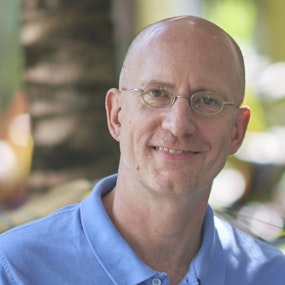
Brent Hartinger
Author, Screen Writer, and World Traveler
Brent Hartinger is a full-time writer, digital nomad, and the co-founder of Brent and Michael are Going Places. Brent has written fourteen novels and had ten screenplays optioned, two of which were turned into full-length feature films!
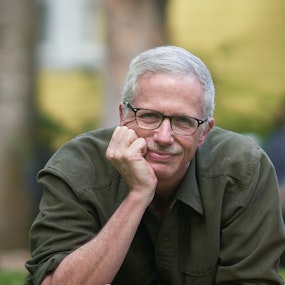
Michael Jensen
Author, Editor, and Digital Nomad
Michale Jensen is an author and editor. His novels include Man & Beast and Man & Monster, part of The Savage Land, a series of historical fiction that combines gay romance, supernatural, and horror. For eight years, Michael was the editor of the entertainment website AfterElton.com, which he co-founded with Brent Hartinger. The site, devoted to covering gay and bisexual men in popular culture, eventually grew to more than a million unique visitors a month, won several GLAAD Media Awards, and was later sold to Viacom/MTV.


























